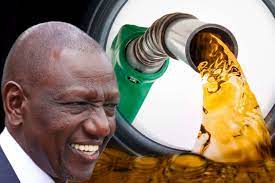Africa (Commonwealth Union) _ President William Ruto’s government has extended a deal with state-owned Gulf firms, including Saudi Aramco, Emirates, and Abu Dhabi oil companies, to continue importing fuel on credit for another year. These firms will supply Kenya with petrol, diesel, kerosene, and jet fuel until December 2024. The first payment of $82 million is due on September 25, with an additional $405 million due at the end of October.
The government initially entered into this government-to-government agreement to ease pressure on the weakening Kenyan shilling. Under the previous six-month agreement, Saudi Aramco supplied diesel, while the Abu Dhabi National Oil Company delivered petrol, and payments were made in Kenyan shillings instead of US dollars.
Despite initial expectations that this arrangement would stabilize the exchange rate and keep the shilling trading below 120 per unit against the dollar, the Kenyan currency has depreciated further, with exchange rates now exceeding 145. This depreciation is attributed to the significant dollar demand required for petroleum imports, accounting for 28% of total demand.
As a result of the ongoing fuel imports and rising oil prices, the Energy and Petroleum Regulatory Authority (EPRA) increased fuel prices in Kenya, with petrol up by KSh 16.96, diesel by KSh 21.32, and kerosene by KSh 33.13 per litre. This brought the retail prices to KSh 211.64 for petrol, KSh 200.99 for diesel, and KSh 202.61 for kerosene per litre in Nairobi.
While the Kenyan shilling may receive support from other factors such as weakening Chinese import prices, increasing diaspora remittances, and fiscal tightening measures, the settlement of the oil import debt is expected to cause temporary upside volatility, potentially pushing the shilling beyond the KSh 150 mark by the end of September.
This continued reliance on credit imports highlights the government’s efforts to manage foreign exchange and stabilize fuel prices amid economic challenges, including inflation and currency depreciation.








